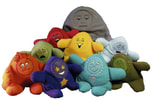|
1. Ask them to tell you how they feel.
Ask your children to show you their emotions. Let them express themselves to you. When they seem to have something on their mind ask them about it. 2. Don’t make them feel as if they are doing something wrong by feeling the way they do. Your children cannot stop their emotions from coming. Just because you don’t think they are reacting to something how you would or how they should doesn’t mean they are wrong for feeling the way they do. They are their own people and you should remind yourself of that. 3. Teach them to recognize their emotions. You need to teach your children to label the things they’re feeling. When they’re mad make sure they know that’s what they’re feeling. Don’t let them go through the motions unable to express themselves properly. 4. Do not squash their individuality. Let your children express themselves. Do not step all over who they are. If they want to wear red hair clips, let them. Don’t force them to wear green ones just because you like them better. 5. Use feeling words when you speak to them. When you’re feeling something make those feelings known. Label your own emotions so your kids will know what is going on within you as well. Don’t leave them guessing. 6. Stress the importance of positive self-talk. Remind your children time and time again how important it is to talk positively about themselves. When they’re upset or stressed they need to know how to remind themselves that things will be alright. They need to be able to motivate themselves. 7. Talk about uncomfortable emotions. Be willing to talk about the things your kids might consider to be uncomfortable. Sure, sadness doesn’t feel good but it is unavoidable. They need to know that they are not alone. 8. Allow them to express themselves through art and other things of the sort. Let your kids express themselves properly. Make sure they have some kind of outlet. This could be music, art, or anything else that they take interest in. 9. Talk to them about how you handle your emotions. Talk to your children about how you handle your own emotions. Make sure they know that you work to cope with the things you’re feeling properly and how important that kind of thing is. They should know that bottling their emotions is not a good thing to do. 10. Spend time outdoors together.Being outside is something that helps to relax people big time. Making sure your kids know the importance of being in nature and spending time with the people they care about. While it might not seem like much at first as time passes it will work wonders. 11. Set a good example emotionally, don’t overreact or lash out. Set a good example for your kids. They react to the way you act and will change themselves sometimes in order to mimic you. If you are handling your emotions properly they will also be able to work towards the same. 12. Set boundaries with your children without dismissing them. Make sure your kids know that when it comes to their emotions they need to think before they act. Just because they might feel bad doesn’t mean they should lash out. There are consequences for everything we do. 13. Make sure they are comfortable coming to you to talk about this kind of thing. Be there for your kids and make sure they know that they can come to you. They need to feel safe and secure with you. They need to know that you will not judge them. 14. Use the shows, books, and other things your children like to go over emotions. Use things they like to help them relate better. If they see someone sad on a show ask them how that makes them feel. Teach them in the ways you feel they need. Go over emotions and make sure you don’t forget any of them. Reprinted from https://awarenessact.com/stop-teaching-children-to-never-be-angry-teach-them-how-to-be-angry/
0 Comments
Leave a Reply. |
Barb Kobe and
|


 RSS Feed
RSS Feed
